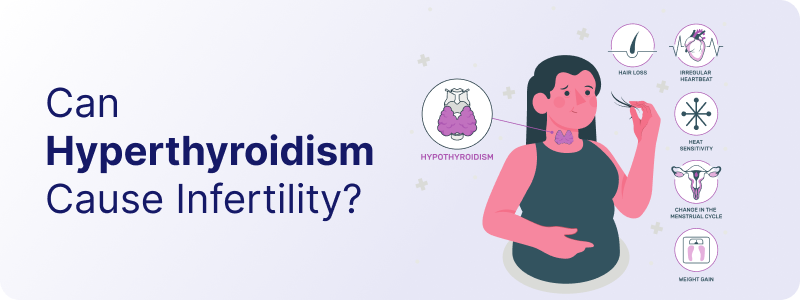
Hyperthyroidism, a condition characterized by an overactive thyroid gland, can have significant implications for fertility in both men and women. In this 1500-word overview, we'll explore the interplay between hyperthyroidism and infertility, including how thyroid function affects reproductive health, the potential causes and mechanisms underlying infertility in individuals with hyperthyroidism, and the management strategies available to address these challenges.
The thyroid gland plays a crucial role in regulating metabolism, energy production, and various physiological processes throughout the body. Hyperthyroidism occurs when the thyroid gland produces an excessive amount of thyroid hormones, primarily thyroxine (T4) and triiodothyronine (T3). This overproduction can lead to a wide range of symptoms, including weight loss, rapid heartbeat, heat intolerance, anxiety, and tremors.
Thyroid hormones play a critical role in the regulation of reproductive function in both men and women. In women, thyroid hormones influence ovarian function, menstrual regularity, and ovulation. Thyroid dysfunction, whether hypo- or hyperthyroidism, can disrupt the menstrual cycle, leading to irregular or absent periods and affecting fertility. In men, thyroid hormones are involved in spermatogenesis, and abnormalities in thyroid function can impair sperm production and quality, potentially leading to infertility.
Hyperthyroidism can arise from various underlying causes, including autoimmune conditions such as Graves' disease, which involves the production of antibodies that stimulate the thyroid gland to overproduce hormones. Other potential causes of hyperthyroidism include thyroid nodules or tumors, excessive iodine intake, and certain medications. Understanding the underlying cause of hyperthyroidism is essential for appropriate management and treatment.
In women, hyperthyroidism can disrupt the normal function of the hypothalamic-pituitary-ovarian (HPO) axis, which regulates the menstrual cycle and ovulation. Elevated levels of thyroid hormones can lead to irregular menstrual cycles, anovulation (lack of ovulation), and reduced fertility. Additionally, untreated hyperthyroidism during pregnancy can pose risks to both maternal and fetal health, including an increased risk of miscarriage, preterm birth, and fetal growth restriction.
In men, hyperthyroidism can affect sperm production and quality, leading to decreased sperm count, motility, and morphology. Thyroid hormones play a role in the regulation of testicular function and spermatogenesis, and abnormalities in thyroid function can disrupt these processes. As a result, men with untreated hyperthyroidism may experience infertility or subfertility.
The diagnosis of hyperthyroidism typically involves a combination of clinical assessment, including a thorough medical history and physical examination, and laboratory testing to measure levels of thyroid hormones (T4 and T3) and thyroid-stimulating hormone (TSH). Additional tests, such as thyroid ultrasound or thyroid uptake scan, may be performed to evaluate the underlying cause of hyperthyroidism, especially if autoimmune thyroid disease or thyroid nodules are suspected.
The management of hyperthyroidism in individuals seeking fertility treatment requires a multidisciplinary approach involving endocrinologists, reproductive specialists, and other healthcare providers. Treatment strategies aim to normalize thyroid hormone levels while minimizing potential risks to reproductive health and fertility.
The treatment of hyperthyroidism depends on the underlying cause and the individual's clinical presentation. Common treatment options include antithyroid medications such as methimazole or propylthiouracil (PTU), which work by inhibiting the production of thyroid hormones. In some cases, radioactive iodine therapy or thyroidectomy (surgical removal of the thyroid gland) may be recommended, particularly if medical therapy is ineffective or contraindicated.
The choice of treatment for hyperthyroidism can impact fertility outcomes, particularly in women. Antithyroid medications are generally considered safe during pregnancy and can be used to control hyperthyroidism while attempting to conceive. However, methimazole is associated with a slightly higher risk of birth defects compared to PTU, especially when used in the first trimester. Radioactive iodine therapy and thyroidectomy are not recommended during pregnancy due to potential risks to the developing fetus.
Individuals with hyperthyroidism who are planning to conceive should receive preconception counseling to optimize thyroid function and reproductive health. This may involve medication adjustments, monitoring of thyroid hormone levels, and management of any associated comorbidities. Close collaboration between endocrinologists and reproductive specialists is essential to ensure a coordinated approach to care.
In cases where hyperthyroidism coexists with infertility, fertility treatments such as in vitro fertilization (IVF) may be considered. However, it's important to optimize thyroid function prior to initiating fertility treatment to maximize the chances of success and minimize potential risks to maternal and fetal health. Thyroid hormone levels should be closely monitored throughout the treatment process, with adjustments made as needed to maintain euthyroidism (normal thyroid function).
Hyperthyroidism can have significant implications for fertility in both men and women. Abnormalities in thyroid function can disrupt reproductive health and contribute to infertility or subfertility. However, with appropriate management and treatment, including normalization of thyroid hormone levels and optimization of reproductive function, individuals with hyperthyroidism can achieve successful conception and pregnancy. Close collaboration between endocrinologists and reproductive specialists is essential to ensure comprehensive care for individuals seeking fertility treatment in the context of hyperthyroidism.